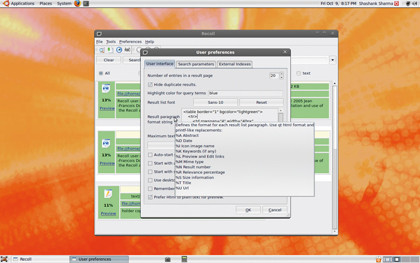6 of the top desktop search tools for Linux
Do desktop search tools spell the end of grep?
Winner: Recoll - 9/10
The most startling aspect of desktop search tools is that many are yet to reach the big version 1.0. Despite that, each program grows more impressive with every release. While the majority of their features are the same across the board, almost every application has something unique to offer.
As desktop search tools eat up enough disk space to shame the great mountain apes, you need to carefully choose the one that you want to implement on your system. While most of these tools have celebrated a few birthdays already, desktop search as a whole (and these tools individually) doesn't have a large user base.
You'll still find more people discussing grep than you will Recoll. Quite possibly, this stems from a misconception that desktop search tools are resource-hungry. Nothing could be further from the truth.
Top three
Although we weren't exactly spoilt for choice, it wasn't easy deciding the finishing order because the three podium contenders, Google Desktop, Beagle and Recoll, made for some stiff competition. Here's hoping that this also drives innovation.
But first, let's consider the ones that didn't make it to the top three. The worst thing about Strigi is its lack of page navigation. You can't use a tool if it won't let you browse through the pages of search results.
Sign up for breaking news, reviews, opinion, top tech deals, and more.
Tracker, however, has all the makings of a top contender. The ability to specify which directories to watch and index translates to a smaller index size, which is why it gets 7/10 despite the broken tagging feature and slow launch time.
Coming in at number three is Google Desktop. This tool gets bonus points for using the browser to display results, but the advanced search section could still use a little refinement. The auto-suggestion feature in the search applet is helpful, although the fact that it's limited to showing only the top six results in the applet by default is a definite design flaw in our book.
Meanwhile, the unfairly maligned Beagle comes in at number two. One of this tool's strong points is that it keeps the size of the index small, especially compared with Strigi and Google Desktop. With a network-accessible browser interface in the offing, Beagle's future as one of the best is sealed.
With strong competition from Beagle, especially in the number of search options, Recoll just manages to cling on to the top spot. Forcing the user to index the system manually is actually a clever design.

For anyone who's convinced that desktop search tools eat up too many resources, this offers the opportunity to index the system at a convenient time. It should therefore help Recoll to attract users who'd normally distance themselves from desktop search tools.
Defining the keywords to look for and avoid for each search helps Recoll accurately locate the correct file each time. Other tools should also consider adopting this feature.
-------------------------------------------------------------------------------------------------------
First published in Linux Format Issue 127
Liked this? Then check out Linux on the move: the future of portable distros
Sign up for TechRadar's free Weird Week in Tech newsletterGet the oddest tech stories of the week, plus the most popular news and reviews delivered straight to your inbox. Sign up at http://www.techradar.com/register

Shashank Sharma is a trial lawyer in Delhi, India. Long before his foray into the world of litigation, he started his career by writing about Linux and open source software. Over the years, Shashank has also written various articles and reviews for TechRadar Pro, covering web hosting providers and website builder tools.